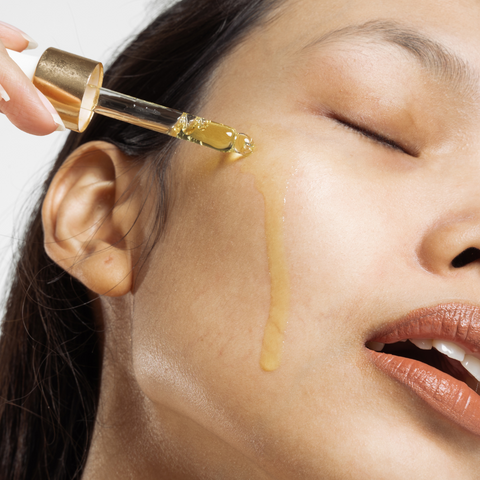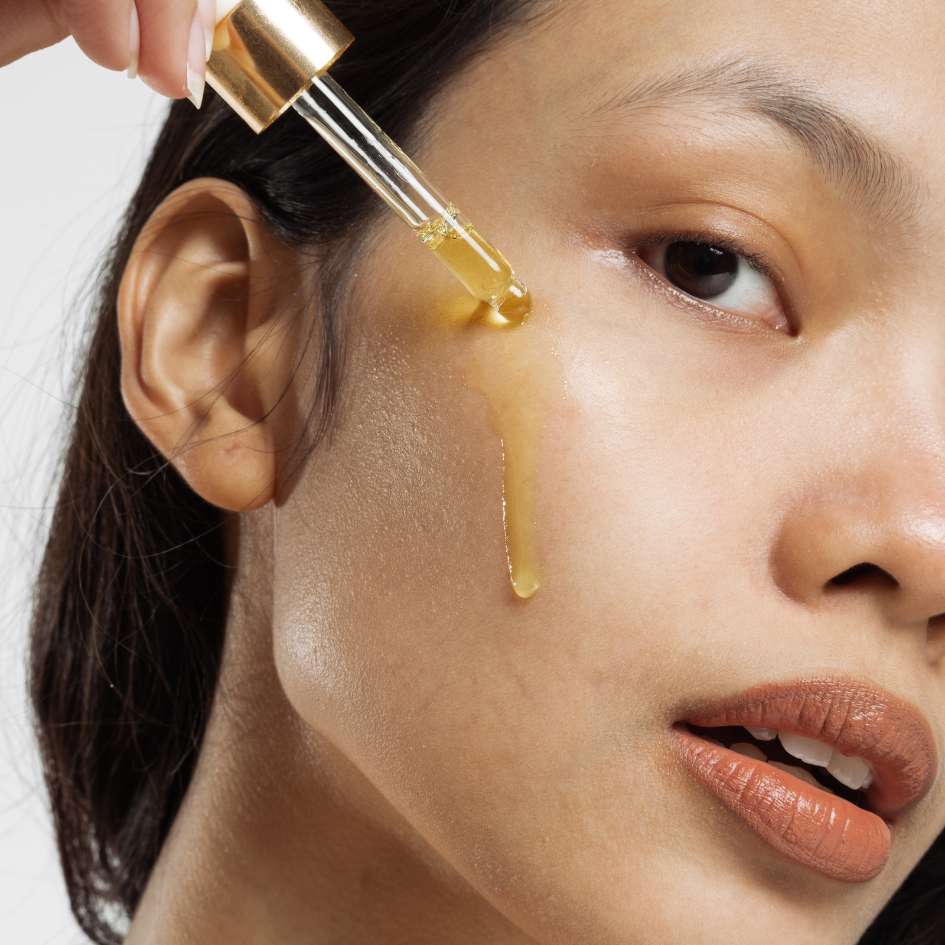Increasingly present in the cosmetic offer, vegetable oils have gradually invaded our bathrooms. But how to integrate them into our beauty routines and especially which oil to choose according to our skin and our concerns?
We will explain everything to you.
FIRST OF ALL, WHAT IS A VEGETABLE OIL?
A vegetable oil is an oil derived from a plant, which can come from its seeds, fruits, or kernels. It is typically extracted through cold pressing, or in some cases, with minimal heating before pressing. Opting for cold extraction when obtaining vegetable oil allows you to retain all of its qualities and nutrients.
It's important not to confuse vegetable oil with essential oil, as their extraction methods and cosmetic uses differ. Essential oils are concentrated extracts from plants or flowers and should never be used directly on the skin, as they can cause burns.
Furthermore, it's crucial to distinguish between vegetable oil and mineral oil. Mineral oil is derived from petrochemicals and holds little benefit for the skin, and in fact, it can be harmful. Mineral oils are comedogenic, meaning they can clog the skin's pores, hinder its ability to breathe, and potentially lead to the appearance of imperfections."
These revisions provide a clearer and more accurate understanding of the information presented.
It's important not to confuse vegetable oil with essential oil, as their extraction methods and cosmetic uses differ. Essential oils are concentrated extracts from plants or flowers and should never be used directly on the skin, as they can cause burns.
Furthermore, it's crucial to distinguish between vegetable oil and mineral oil. Mineral oil is derived from petrochemicals and holds little benefit for the skin, and in fact, it can be harmful. Mineral oils are comedogenic, meaning they can clog the skin's pores, hinder its ability to breathe, and potentially lead to the appearance of imperfections."
These revisions provide a clearer and more accurate understanding of the information presented.
BUT THEN, DOES APPLYING AN OIL TO MY SKIN GIVE PUMPS?
No of course, it's a myth as old as the world!
If you choose a vegetable oil suitable for your skin, it will not cause you acne. It can even regulate sebum production, have anti-inflammatory properties or help heal your imperfections.
WHICH VEGETABLE OIL FOR MY SKIN?
If applying a vegetable oil to your skin is beneficial, you can still favor those that are the most effective for your skin type and of which we have drawn up a non-exhaustive list here:
Oily skin :
Opt for a hazelnut vegetable oil, very fine, with a matte finish and regulating properties.
Mixed skin :
Adopt jojoba oil: it has the same structure as sebum and helps regulate its production.
Dry skin :
You can adopt borage oil (rich in fatty acids, essential for rebuilding the skin barrier) or hemp oil (very rich in omega 3 and 6).
Acne skin:
Give black cumin oil (with anti-bacterial properties) a chance.
Sensitive skin :
Soothe your skin with apricot, sweet almond or hemp oil.
Mature skin: the choice is yours!
Argan (rich in antioxidant)
Prickly pear (restorative and protective)
Hemp (anti-oxidant, repairer)
Marula (natural vitamin C content)
Skin prone to spots and scars:
Adopt wild rose oil (rich in vitamin A which accelerates cell renewal and unifies the complexion).
Normal skin:
The choice is yours, but the most universal and complete are jojoba, hemp and argan oils.
Dull skin:
Try wild rose oil, carrot oil (naturally rich in beta carotene) or buriti oil. Good-looking effect guaranteed!
HOW DO I USE MY VEGETABLE OIL?
First of all, it must be understood that the function of a vegetable oil is not to moisturize the skin. A vegetable oil has the function of nourishing it. That is to say, to provide it with lipids to strengthen the skin's barrier function and prevent water evaporation.
Containing no aqueous element, it does not moisturize.
However, the skin needs water and fat to be healthy. The ideal is therefore to provide, via the treatment, aqueous active ingredients (water) and nutritive active ingredients (fat).

It is therefore advisable to apply its oil after an aqueous serum, for example a serum containing hyaluronic acid or glycerin or even, for fans of raw products, an aloe vera gel.
It is also possible to apply its oil after its moisturizer.
YOU HAVE SEVERAL PRODUCTS AND YOU DON'T KNOW IN WHICH ORDER TO APPLY THEM?
The rule: from the most watery to the fattest. Or if you don't know the composition of your products: moisturizing serum, cream, oil.
The interest is that the oil creates a protective barrier that prevents water from evaporating and protects the skin from dehydration. And hydrated skin is skin that ages less quickly.
CAN I USE VEGETABLE OILS DURING PREGNANCY?
Yes, vegetable oils can even be a significant asset to help you overcome the minor inconveniences of pregnancy.
To prevent stretch marks on the hips and stomach, use and abuse shea butter. And if you are sensitive to odors during this period, choose it deodorized.

If your face is dry due to pregnancy, an argan vegetable oil can relieve you.
If, on the contrary, imperfections appear, you can opt for hazelnut oil (avoid nigella, which is contraindicated).
To massage heavy legs, opt for borage oil.
CAN I PUT MY VEGETABLE OIL ON THE EYE CONTOUR?
Yes, but… not if your eye area is very thin! This could create what are called milium grains: these small hard white balls which can appear in the event of application of too rich products.
Prefer a daytime application if you wake up with puffy eyes in the morning. Indeed, during the day, the eye is in motion, which circulates the products that are applied to the eye contour. At night the area is less mobile and the oils can clog it up and you wake up looking tired.
If you are prone to dark circles, calophyl oil boosts micro-circulation.
If your eye area is dry, opt for avocado oil.
AND FOR MY HAIR, WHICH VEGETABLE OIL SHOULD I CHOOSE?
Take oil baths!
To repair dry and damaged lengths, generously apply your oil to dry hair and leave to act under a hot towel for 30 minutes before washing your hair. Be careful, two shampoos may then be necessary.

WHICH VEGETABLE OIL SHOULD CHOOSE ACCORDING TO MY HAIR TYPE?
Dry hair :Argan Oil
Avocado oil
Hair sensitized by colors, streaks or discoloration:
Coconut oil
Frizzy and very dry hair:
Shea butter or oil
Thinning hair:
Castor oil (at the root, before shampoo) accompanied by a stimulating scalp massage.
AND FOR MY BODY?
The little trick for vegetable oils to penetrate quickly without leaving a greasy film on the body is to apply them after showering on slightly damp skin.
For extremely dry, atopic skin or to prevent stretch marks:
Shea butter is perfect.
For dry skin:
Massage yourself with argan oil.
AND TO STRENGTHEN NAILS, EYELASHES, HAIR OR BEARD, WHICH VEGETABLE OIL TO CHOOSE?
Consider castor oil!
Now you see how vegetable oils can have a place in your bathroom! You can even mix them, to obtain your own personalized treatment and take the opportunity to perform self-massage exercises.
And when you're lazy, use a ready-made cosmetic treatment. The organic and 100% natural Go For Protection Moisturizer contains, among other things, hyaluronic acid, moisturizing aloe vera and antioxidant vitamin E coupled with apricot oil for radiance! And its texture is incomparable!
Enjoy!!


